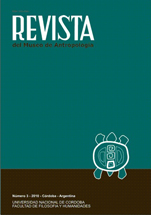The girls in the house, the boys on the street. General construction, violence and sociability practices in Villa el Nylon, Córdoba
DOI:
https://doi.org/10.31048/1852.4826.v3.n1.5449Keywords:
young, spaces, couples, gender, violenceAbstract
In the present work I propose the analyse of the ways in that youngs of Villa El Nailon of the city of Córdoba become by gender in men and women through practices and senses legitimated and built socially in said villa. From analysing the observations and interviews realized with boys and girls of between 15 and 30 years roughly, like this as with their familiar and neighbouring is that I build an ethnography of the senses and practices through which they delimit spaces and ways of inhabit them, considered favourable or desfavorables for the subjetivity that forge themselves. This way, I analyze the continuity that one presents between the manners with which from the earliest infancy they structure the uses of the different spaces of the villa with the divisions and inequalities in the relations of conyugality. The analysis of labor practices and of friendship are constituted also in central areas to understand how the use of the violence in the exchanges between young people and groups regulate the relations and are constituted in symbolic spaces to construct and to demonstrate masculinities or femininity that face and are not bent easilyDownloads
References
Blázquez, G. 2008 Nosotros, vosotros y ellos: Las poéticas de las Masculinidades Heterosexuales entre jóvenes cordobeses. TRANS
Revista Transcultural de Música. Julio. Nº 12. Sociedad de Etnomusicología. Barcelona España. http://redalyc.uaemex.mx/redalyc/src/inicio/ArtPdfRed.jsp?iCve=82201206
Blázquez, G. 2006 Y me gustan los bailes… Haciendo género a través de la danza de cuarteto cordobés. Etnografías contemporáneas. Año 2, número 2. Buenos Aires: Universidad Nacional de San Martín.
Bourdieu, P. 1968 El sentimiento del honor en la sociedad de Cabilia. En Peristiany, J. G. (1968) El concepto de honor en la sociedad mediterránea. Barcelona: Ed. Laborsa.
Butler, J. 2002 Cuerpos que importan. Sobre los límites materiales y discursivos del “sexo”. Introducción. Buenos Aires. Paidós.
Butler, J. 2001 [1999] El Género en disputa. El feminismo y la subversión de la identidad. Prefacio de. México: Ed. Paidós.
Corrigan, P. 1982 [1976] Doing nothing en Hall, Stuart y Jefferson, Tony (eds.) Resistance through rituals. Youth subcultures in post-war Britain. London: Hutchinson.
Descolá, P. 2005 [1993] Las lanzas del crepúsculo. México: FCE.
Garriga Zucal, J. 2007 Haciendo amigos a las piñas. Violencia y redes sociales de una hinchada del fútbol. Buenos Aires: Prometeo Libros.
Gilmore, D. 1999 Hacerse hombre. Ataya, Madrid.
Gutiérrez, A. 2002 La organización de lo cotidiano en familias de un Barrio pobre cordobés. En Falú, Morey y Rainero (eds.) Ciudad y Vida cotidiana. Asimetrías en el uso del tiempo y del espacio. Córdoba: Falú, Morey y Rainero editoras.
Jelin, E. 2006 [1998] Pan y afectos. La transformación de las familias. Buenos Aires: Fondo de Cultura Económica.
Kessler, G. 2002 Sociología del delito amateur. Buenos Aires: Paidós.
La Mendola, S. 2005 O sentido do risco, en Tempo Social, revista de sociología da USP. Vol. 17 n° 2. Nov. de 2005.
Pitt-Rivers, J. 1968 Honor y categoría social en Peristiany, J. G. (1968) El concepto de honor en la sociedad mediterránea. Barcelona: Ed. Laborsa.
Rodigou, M. 2002 Vida cotidiana, trabajo y espacio barrial. Significaciones diferenciales de varones y mujeres de dos sectores socioeconómicos. En Falú, Morey y Rainero (eds.) Ciudad y Vida cotidiana. Asimetrías en el uso del tiempo y del espacio. Córdoba: Falú, Morey y Rainero editoras.
Rossini, G. (2003) Vagos, pibes chorros y transformaciones de la sociabilidad en tres barrios periféricos de una ciudad entrerriana.”En Isla, Alejandro y Míguez, Daniel (2003) Heridas Urbanas. Buenos Aires: Editorial de las Ciencias.
Rotondi, G. 2000 Pobreza y masculinidad. El urbano marginal. Córdoba: Espacio editorial.
Serrano Amaya, J. F. 2004 Menos querer más de la vida. Concepciones de vida y muerte en jóvenes urbanos. Colombia: Siglo del Hombre Editores.
Spagnol, A. S. 2005 “Jovens delinquentes paulistanos”. En Tempo Social, revista de sociología da USP. Vol. 17 n° 2. Nov. de 2005.
Spósito, M. P. 1994 A sociabilidade juvenil e a rua. Revista Tempo Social. Vol. 5 – N° 1 – 2. 1993- (1994)
Downloads
Published
Issue
Section
License
Those authors who have publications with this Journalaccept the following terms:
a. Authors will retain their copyrights and guarantee the journal the right of first publication of their work, which will be simultaneously subject to the Creative Commons Attribution License (Licencia de reconocimiento de Creative Commons) that allows third parties to share the work as long as its author and his first publication in this journal.
b. Authors may adopt other non-exclusive licensing agreements for the distribution of the version of the published work (eg, deposit it in an institutional electronic file or publish it in a monographic volume) provided that the initial publication in this journal is indicated.
c. Authors are allowed and recommended to disseminate their work on the Internet (eg in institutional telematic archives or on their website) before and during the submission process, which can lead to interesting exchanges and increase citations of the published work. (See The Effect of Open Access - El efecto del acceso abierto)












